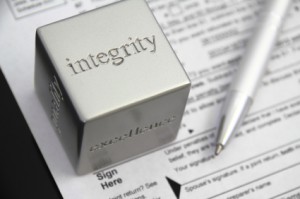Integrity: What’s Up With That?
 Like trust, integrity is something we all talk about, meaning many different things, but always assuming that everyone else means just what we do. That leads to some vagueness and confusion. But a careful examination of how we use the words in common language is useful.
Like trust, integrity is something we all talk about, meaning many different things, but always assuming that everyone else means just what we do. That leads to some vagueness and confusion. But a careful examination of how we use the words in common language is useful.
Integrity and the Dictionary
Merriam Webster says it’s “the quality of being honest and fair,” and/or “the state of being complete or whole.”
If you’re into derivations of words (as I am), then it’s the second of these definitions that rings true. The root of “integrity” is Latin, integer. That suggests the heart of the matter (integral), and an entirety. “Integer” also has the sense of a non-fractional number, i.e. whole, not fragmented, complete.
In manufacturing, we have the idea of “surface integrity,” the effect that a machined surface has on the performance of the product in question: integrity here means keeping a package of specified performance levels intact. Similarly, a high-integrity steel beam is one that will not break or otherwise become compromised within certain parameters of stress.
Related also to this theme of wholeness is the idea of transparency, of things being whole, complete, not hidden – in this sense, we have high integrity to the extent we appear the same way to all people. Think of the phrase “two-faced” as an example of someone without integrity. (For a somewhat different and nuanced take on this issue in cyberspace, see @danahboyd on Mark Zuckerberg and multiple online identities).
Sometimes when we say someone has integrity, we mean they act consistently, in accord with principles. We say someone has high integrity when they stick to their guns, even in the face of resistance or difficulty.
Which raises an interesting question: where’s the line between integrity and obstinacy? For that matter, can a politician who believes passionately in the art of compromise ever be considered to have high integrity?
Then there’s that other common use of integrity that has a moral overtone – honorable, honest, upright, virtuous, and decent. Some of it has to do with truth-telling; but some of it has to do with pursuing a moral code.
Yet that raises another interesting question: can a gang member or a mafioso be considered to have integrity? Can an Occupy person ever consider a Wall Streeter to have integrity? Or vice versa? There may be honor among thieves, but can there be integrity?
Integrity – Your Choice?
So which is it? Does integrity mean you tell the truth? Does it mean you operate from values? Does it mean you always keep your word? Does it mean you live a moral life? Does it mean your life is an open book?
Let’s be clear: there is no “right” answer. Words like “integrity” mean whatever we choose to make them mean; there is no objective “meaning” that exists in a way that can be arbitrated.
But that makes it even more important that we be clear about what we do mean. It just helps in communication.
For my part, I’m going to use “integrity” mainly to mean whole, complete, transparent, evident-to-all, untainted, what-you-see-is-what-you-get.
For other common meanings of “integrity,” I’m going to stick with synonyms like credible or honest; or moral and upright; or consistent.
What do you mean when you think of integrity?

Hi Charlie- this sounds vaguely familiar 🙂 I’m sticking to the “simple” definition of integrity- be honest and moral!
Hi Charlie,
This is a word i have spent some time mulling around because as you point out many people have slight variations on what it means.
Like you I believe it means whole – Authentic – transparent. They way I word it in my values is “my thoughts words and deeds are in alignment…”
So yes, a gang member can have integrity and a priest can be out of integrity.
John,
Along the same lines, my friend Phil McGee wrote to say:
“Gandhi would say that, when what we think, what we say and what we do are in unison we are integrated.”
I like the definition I heard years ago.
Integrity is doing the right thing even when nobody’s looking.
I see it as applying the standards and values that are appropriate for the situation. Some comments here suggest standards are immutable and deviation threatens integrity.
“Turn the other cheek” is appropriate as a standard, as a metaphor, that is meant to describe the concept of forgiveness but an overriding standard of survival exists in a true physical attack.
Integrity is about aligning standards and values to the context and acting in accordance. This is challenging especially if you experience cognitive dissonance between preferences and the needs of a situation.